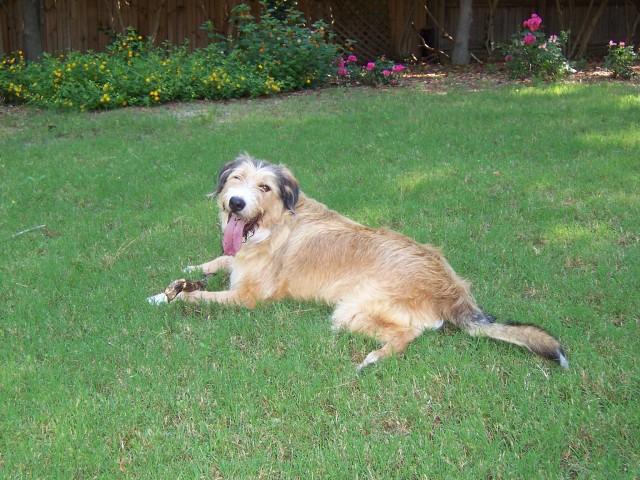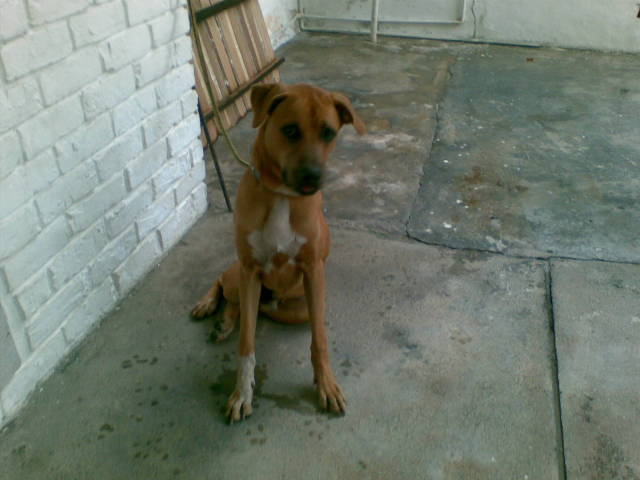Question Tiki
Tiki
QUESTION: Dear Dr. Connor,
My 10 year old Shit'zu/Cavalier mix, Tiki, just had a growth and a good portion of her bladder removed.The Vet says she must empty her bladder every 2 hours.I have been setting my alarm at night, and my elderly Mother has offered to come over to my ground level apt. 4 times a day while I am at work to take her out the back door. My mom isn't strong enough to walk her or carry her down the stairs from her second level apt. I used to drop Tiki off there every morning and they kept eachother company.Tiki to my knowledge has never urinated in the house. She had an accident with runny stool once but she WILL NOT go to the bathroom unless outside. I now need to train her on pads or something in the house as her life and my ability to rest at night depend upon it.Please help me.
Theda
ANSWER: Quite honestly, I don't know if this can be done. It requires the dog to evacuate because there is no other option, i.e., hours and hours (perhaps as long as two days). Because her bladder has been reduced in size, this urgency will most likely be shortened. However, response perseverance (the dog's automatic and conditioned response) makes it difficult (especially at her age) to overcome her trained behavior. My best advice is: take newspaper outdoors with you: put it down in an area she usually urinates in, and keep her on leash in that area until she evacuates, then pick up the soiled newspaper and put it down on wee-wee pads INDOORS. At the next two-hour interval, take her to the soiled papers (on pads), wait for fifteen minutes; if she doesn't eliminate, go back outdoors with more newspapers to the same spot. If she DOES eliminate on the papers indoors, praise her immediately and pop a special treat in her mouth. You'll have to repeat this re-training (take her to the newspaper/pads, slowly eliminate the newspaper) many, many times (over the course of many days, perhaps even weeks), and then slowly eliminate the newspaper while leaving one soiled pad on top of a clean one, until the dog clearly has the idea. Always offer food reward after each indoor urination.
Unfortunately, because your mother lives upstairs, you will have to then generalize this training to yet another area in your mother's home OR make your mother's home THE PLACE to "go". Frankly I'm distressed that any veterinarian would go to this length of treatment in a dog this age. Although this breed can live quite a long time, her condition most likely puts her at very high risk of premature death, and this re-training might be impossible. Quality of life is an important issue. A growth that requires radical surgery is most likely cancerous. The chances of you being able to re-train this dog are quite slim because of the change of venue: not only YOUR place of residence, but your mother's, as well. My strong suggestion is that your mother spend the daytime hours DOWNSTAIRS in your home. This will make the re-training much easier but honestly this is all extremely difficult for the dog. Forcing a dog to empty its bladder every two hours when the dog is persistently house trained is extremely difficult. If your mother came downstairs during the day, none of this would be necessary: the dog could be taken outdoors. I think you veterinarian should have had a quality of life discussion with you prior to this radical surgery. I'm sorry this is all I can offer.
---------- FOLLOW-UP ----------
 Tiki
Tiki
QUESTION: Thank you so much for such a rapid response although I did sob uncontrollably when I read it. The reason my Vet opted for surgery is that the tumor was not in the neck of the bladder and although most times it's cancer, the chance of it being benign does exist. It was bigger than she thought it would be from the ultrasound but had very defined edges and she was able to get it all. If it turns out to be TCC then,of course, defined edges don't matter.I'm waiting on the patholgy.You would never know by Tiki's behavior that she had surgery, She tries to play and I have to keep her calm,lets me know it's dinner time,barks at a knock on the door...acting normal.She pees immediately every time I take her out and has regular bowl movements.I just wish I had been given the option of ultrasound as a preventative since I have learned in researching this that bladder tumors are common in older female dogs.When she was turning ten I should've done research myself about preventative precautions. She's my whole life as I am single with no children or relationship.I know I have to prepare myself as best as I can but I've never had a dog until Tiki so this is a tough one.I am so thankful for a way to try getting her to use the pads...THANK YOU.
ANSWER: I'm SO sorry to have caused you further distress but I had to be honest. I did some research about re-training a house trained dog into an indoor location, it's very difficult to do in an adult, solidly trained dog and I couldn't find one thing about it on the Internet, so that tells you something. One suggestion: go to DogStarDaily.com, Dr. Ian Dunbar's website, and look for article(s) on this re-training. I don't know if it's possible to contact Dr. Dunbar personally through the site but if anyone would *know* how to do this, it would be him. All you can do is what you're doing, since she pees immediately outdoors it should be easy to use the newspapers as explained in an attempt to transition her to indoors, but really it would be far easier all around if your mother could be downstairs or at least come downstairs to take the dog out during the day. I think a second opinion might have been a good idea before doing surgery but too late now and I understand that you trusted your veterinarian. Perhaps your veterinarian is worthy of that trust and made the right choice given the location of the tumor (and its size). If the tumor is not cancerous, it might still return (you should do internet research on this or go to a specialist when the dog is recovered from surgery). Hopefully your little dog will live a long, normal lifespan. After all, radical surgery is done on humans quite frequently with wonderful results. I've lost many dogs over through my lifetime, you never get used to it, it's always devastating. Just enjoy her while she's with you and do the best you can with this situation, as I know you will.
PS: I just did some research and found the following site
http://www.animalemergencycenter.com/images/onc_BLADDER_TUMORS.pdf
If your veterinarian is not following up with medication, I suggest you call the veterinary college in your geographical area and make an appointment with the appropriate specialist on staff, have all the dog's records (including biopsy results) faxed over to them prior to the visit. If this were my dog, I'd want to do everything possible to prolong her life and her quality of life. Please let me know what happens.
---------- FOLLOW-UP ----------
QUESTION: Hi Dr. Connor,it was TCC. Dr. Baker was surprised at that because her experience is when she has seen TCC tumors they are 'angry' as she describes it and all over the place with no defined edges or margins and placed in the neck of the bladder and inoperable.She says this could be less aggressive given it's appearance. We have her on tumor retarding medication (pyroxicam) and she is recommending a visit to an oncologist for a possible free clinical trial of new medications to inhibit tumor growth. Her cat was cured of nasal lymphoma this way and it is years later so I will go this extra step.
I get it that this is bad but you both are Doctors and a scientists and I live in a world of unexplainable miracles aided by all the natural remedies available to me through research.
I'll keep you posted!
Theda
AnswerI think the oncologist is the next stop, definitely. There ARE miracles, I know, I saw one up close and personal once and have seen many others less dramatic, but equally qualified as miraculous. You do what you can and you love your dog as long as you have her.
PS: found this site, you may qualify as a candidate for tests, remember that chemotherapy is sometime worse than the disease it's treating:
http://www.marvistavet.com/html/body_transitional_cell_carcinoma.html



 Is this aggression, dominance, or play?
QuestionQUESTION: I have a question regarding doggy beh
Is this aggression, dominance, or play?
QuestionQUESTION: I have a question regarding doggy beh
 anxious dog
Question
Louie
Hi, We adopted a 2 year old male A
anxious dog
Question
Louie
Hi, We adopted a 2 year old male A
 Sudden aggression within pack after a death
Question
Sudden aggression in o
We have an approximatel
Sudden aggression within pack after a death
Question
Sudden aggression in o
We have an approximatel
 Companion for Lonley Westie
Question
Shannon
We have a 5-year-old neutered Westie w
Companion for Lonley Westie
Question
Shannon
We have a 5-year-old neutered Westie w
 dogs behaviour
QuestionMy 8 months old Dusto
QUESTION: My puppy
dogs behaviour
QuestionMy 8 months old Dusto
QUESTION: My puppy